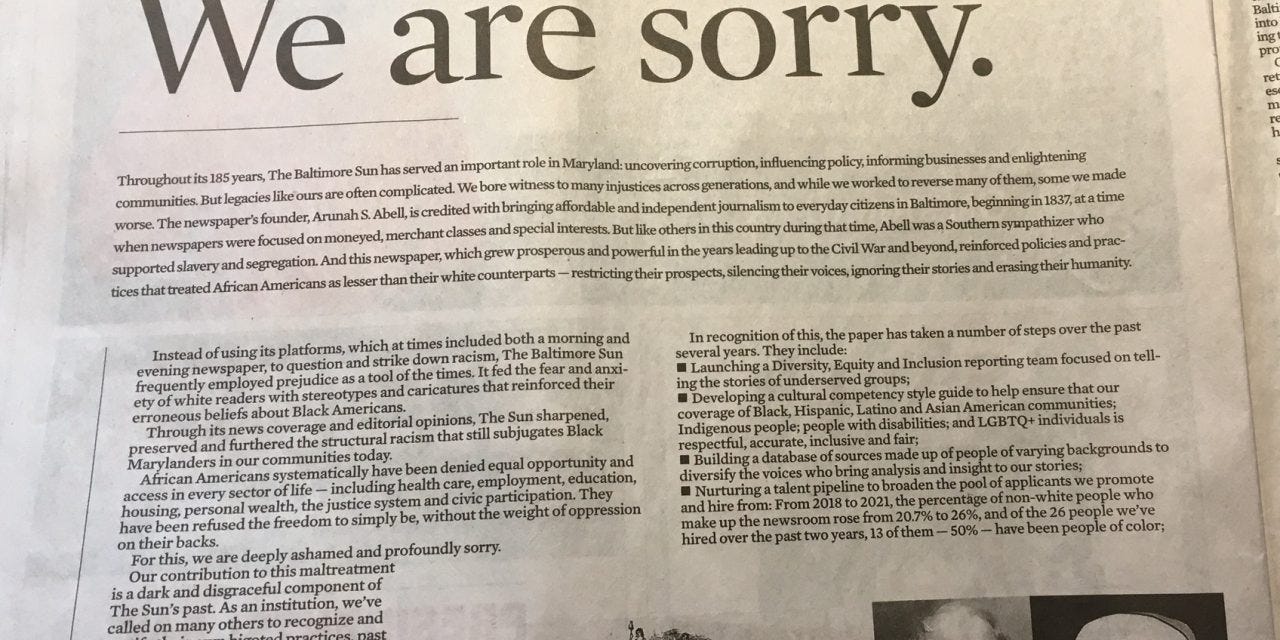We are deeply and profoundly sorry: For decades, The Baltimore Sun promoted policies that oppressed Black Marylanders; we are working to make amends. - Baltimore Sun Editorial Board.
At Hard Histories at Hopkins it’s no coincidence that our work began in the wake of George Floyd’s murder and the uprisings in Minneapolis and elsewhere that followed. We heard the calls for justice issued in the wake of that tragic police killing in 2020. Yes, our work began after a closer look into Mr. Hopkins’ census returns. It also responds to the calls for racial reckoning that animated the nation’s streets, including here in Baltimore City, that summer.
Our work — recovering the history of racism and discrimination at Johns Hopkins — is one facet of that reckoning. And in Baltimore we are not alone. Instead, we are one part of an accounting in our city. As a Lab, we have visited Clifton Mansion, the summer estate of Johns Hopkins, where efforts to acknowledge and honor the experiences of those enslaved at Clifton Mansion are ongoing.
We have studied how the Walters Art Museum incorporated the life and the labor of Sybby Grant, a woman enslaved at One West Mount Vernon Place, into their public interpretation. More recently, the Museum told of how William and Henry Walters, during the Civil War and even well beyond, supported the Confederacy. In 2020, the Maryland Historical Society “rebranded” and became the Maryland Center for History and Culture, reflecting a new commitment to being a fully inclusive institution. Recall, the MCHC had its origins as an off-shoot of the Maryland Colonization Society.
In Baltimore, there are many places ripe for the work of acknowledgement and reckoning, and last week The Baltimore Sun publicly joined those efforts with an extended editorial. The paper began with a chronicle of “offenses,” and a list of efforts at what it termed atonements. Already, Baltimoreans are “talking back” to the paper’s editorial board. Among us are thoughtful doubters and skeptics along with readers who endorse this step toward a different future. (And the Sun has invited us to do more talking back by writing to talkback@baltimoresun.com.) One response came from Will Schwarz, president of the Maryland Lynching Memorial Project who suggested that, among other things, the Sun editorial may be a new starting place for progress, healing and reconciliation.
At the Hard Histories Project, we recognized the racism that the Sun’s editors foregrounded because the paper has been one source of our research. But it has not been the only news source upon which we’ve relied. Our insights have importantly benefitted from readings of Baltimore’s Black-owned newspaper, The Afro-American, which since 1892 has consistently offered a counterpoint to the Sun. Lab members have charted how the Afro, its editors and it correspondents, told another story about Black Baltimoreans and about Johns Hopkins.
Stay tuned here for more about our work developed through research into the Afro. And mark you calendars for Monday, March 28, 2022 from 12 noon to 1 pm ET when we’ll be joined live by Savannah Wood, Executive Director of Afro Charities, Inc., and Dr. Kim Gallon, Visiting Associate Professor of Medicine at the JHU School of Medicine and instructor at the Hard Histories at Hopkins Lab. We’ll talk about how journalism, print culture, and literary production have shaped the past and the present of Baltimore City.
— MSJ.



